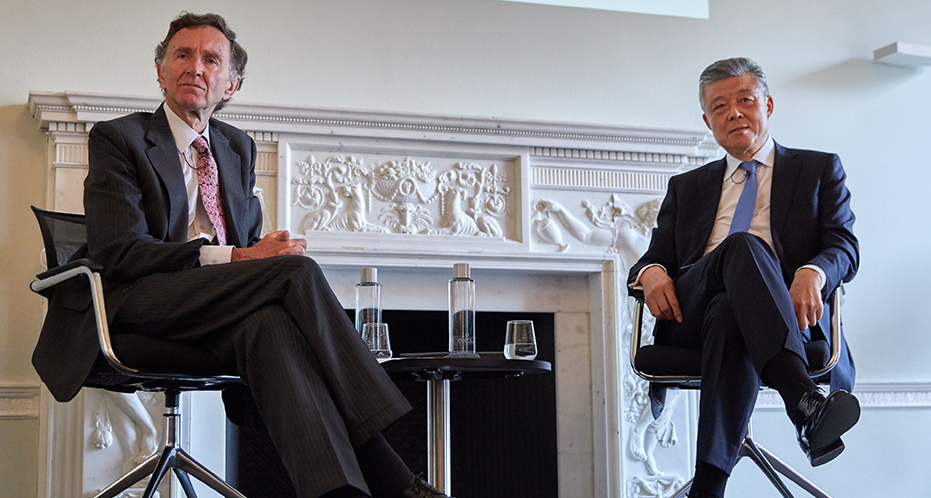Driving commercial and political engagement between Asia, the Middle East and Europe
Driving commercial and political engagement between Asia, the Middle East and Europe
Driving commercial and political engagement between Asia, the Middle East and Europe

Edward Danks, Content Producer
On 24 June, Chinese Ambassador to the UK, HE Liu Xiaoming, and Asia House Chairman, Lord Green of Hurstpierpoint, met in conversation at Asia House. China’s developmental trajectory, the stability of multilateralism and the rules-based global order, and the state of Chinese relations with some of its closest neighbours were among the topics discussed.
With opinion split regarding the sustainability of Chinese development, Lord Green asked Ambassador Liu for his views on the future path of Chinese development. Ambassador Liu noted that while China had experienced phenomenal developmental successes over the past 40 years, there was still a long way to go. With high levels of wealth disparity between China’s coastal regions and its central hinterland, the government was committed to alleviating this inequality and helping the remaining 10 million Chinese citizens still living in poverty. Given the challenges posed by these domestic issues, Ambassador Liu suggested that China was in no position to challenge the US on the global stage.
Lord Green questioned what impact the current trade dispute between China and the US, and rising protectionism, would have on the global trading system, multilateralism, and the rules-based international order. Sharing Lord Green’s concerns, Ambassador Liu argued that despite its shortcomings and need for reform, the World Trade Organization (WTO) should still form the basis for global trade. Suggesting that the world was a “community of shared interests”, His Excellency pointed out that trade was to the benefit of all and should not be viewed as a zero-sum-game.
Both Lord Green and Ambassador Liu also agreed that reforming the WTO represented a huge challenge. Lord Green noted that China’s debatable market economy status will prove an issue when reforming the WTO, and Ambassador Liu suggested that any reform had to reflect changes in global politics and better represent the interests of developing nations.
Lord Green observed that alongside bipartisan support for a tough stance on China from within the US, the rhetoric and policy of other western states had also become more critical of China. Germany’s recent attempts to safeguard its national, industrial and economic interests in its National Industrial Strategy 2030 and the harsh language used in the EU’s recently published strategic outlook on China were some examples of this. Ambassador Liu responded by highlighting that the UK had been a reliable partner of China notwithstanding that certain forces in the UK that wanted to mirror this shift. To address this issue, Ambassador Liu said that China must do more to reassure people of its good intentions and its desire to collaborate constructively.
When asked about Huawei, Ambassador Liu said that he was worried about its role in the UK. He highlighted how the company had set up the “Huawei Cyber Security Evaluation Centre”, which aims to ensure that UK infrastructure isn’t compromised. Additionally, the Ambassador pointed out that the UK has always been considered as open and business-friendly, and if Huawei was not allowed to operate here, it would send a bad message to international businesses.
On the question of recent protests in Hong Kong, when asked whether the Sino-British Joint Declaration was still relevant, Ambassador Liu said that it had been misinterpreted and was viewed as a “historical document” by the Chinese government. China remained committed to the one country two systems principle. Amending the legislation had come at the Hong Kong government’s own initiative and was not ordered by the Chinese Central Government. The Chinese government understood the Hong Kong government’s decision to suspend the amendment given that it was based on their own interests and assessment of the situation. He concluded by saying that Hong Kong and China want to work out a solution to the current issues collaboratively.
Watch the full event below
